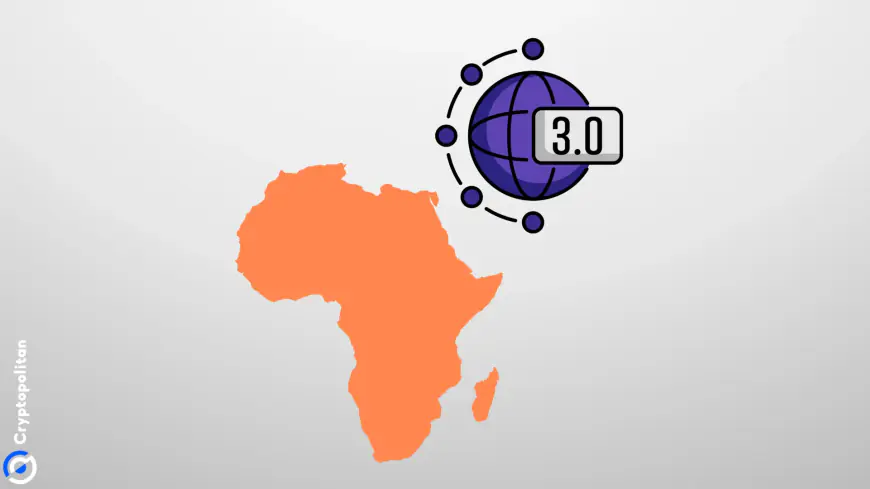Africa dominates Web3 adoption as it outpaces the west
A report published by EMURGO Africa and PwC revealed that Web3 technologies are being adopted more widely in Africa. A separate report by EMURGO Africa emphasized that Big Tech companies actively contributed to the widespread adoption of Web3 technologies throughout the continent.

A report published by EMURGO Africa and PwC revealed that Web3 technologies are being adopted more widely in Africa. A separate report by EMURGO Africa emphasized that Big Tech companies actively contributed to the widespread adoption of Web3 technologies throughout the continent.
KASI Insight reported that over 66% of surveyed African consumers had heard of crypto, with only about 18% of the respondents claiming to have heard about crypto for the first time during the survey. Africa’s global blockchain deal share increased from 1.2% to 1.3% in 2023 and then increased to an all-time high of 1.8% in the first half of 2024.
African blockchain businesses raised $34.7 million across 12 deals, representing a 9% increase in H1 2024. The YoY funding increased by 125%, with the deal count surging by 700% in Q2 2024.
Consumer habits and attitudes provide an outlook on Web3 adoption in Africa and emerging markets
In a survey by ConsenSys on crypto awareness in Africa and emerging markets, the proportion of respondents who affirmed they understood cryptocurrencies was much higher in Nigeria (78%), South Korea (63%), South Africa (61%), Brazil (59%), and India (56%). They were much lower in Japan and Indonesia, with just 1 in 3 confirming they knew about crypto.
Afcacia.io claimed that crypto cross-border payments recorded growing demand in Africa, boosting the adoption of blockchain technology. Lower transaction fees were the major driver for the seismic shift to Web3 platforms, especially among Africa’s middle-class users. A Data Mynt report confirmed that fees charged on cross-border payments in Africa were the highest globally, with an average cost of 8.9% of the transaction value. The data showed that the global average cost of cross-border payments was 6.8%.
Nearly 10% of African financial transactions were digital, with Nigeria, South Africa, Egypt, and Kenya accounting for 66% of the digital revolution.
GameFi also experienced significant growth in Africa, fueled by reduced mobile internet costs, higher smartphone access, and a young, tech-savvy population. Ethiopia, Kenya, Nigeria, and South Africa were the top GameFi markets in Africa, with play-to-earn games being the core concepts. Smartphone gaming accounts for 92% of all gamers, with at least 63% of gamers having paid for gaming services. The continent’s GameFi market was expected to hit $1 billion by the end of 2024.
Researchers explore the state of Web3 in Africa
Chainalysis’ data showed that the cryptocurrency market in Africa grew by over 1,200% between 2020 and 2021, with Tanzania, Kenya, and South Africa ranking among the top 20 for crypto adoption. Nigeria, Kenya, and South Africa received over 70% of blockchain funding in Africa in 2021. The funding growth of blockchain ventures was 11 times more when considering 2021 and Q1 2022.
The potential areas of application for blockchain technology in Africa included SME financing, supply chain, governance, smart contracts for informal labor markets, title deed registration, mobility, verification of education credentials, and digitizing trade infrastructure.
Kenya had a high crypto adoption rate, placing fifth globally in crypto ownership as a share of the country’s total population as of 2021.
In 2021, Godwin Emeiele, the CBN governor, noted that the eNaira had reached over 840K downloads, with nearly 270K active wallets comprising over 250K consumer wallets and about 17K merchant wallets since the eNaira was launched. Additionally, the volume and value of transactions on the eNaira platform reached over 200K and $9 million (4B Naira), respectively.
In South Africa, Web3 was characterized by the increased use of machine learning technologies and AI to enhance process automation and user experiences. A key trend on the rise was the use of dApps and blockchain technology in the agriculture sector to trace and track produce origins to ensure food safety and the transparency of supply chains.
According to Afcacia.io, Large U.S. fintechs like Coinbase, Block, ConsenSys, and Circle were likely to expand their operations to Africa through partnerships with local Web3 platforms. The report showed that remittances comprised 1.3% of GDP in Sub-Saharan Africa. The transaction value grew at an annual rate of 5.2% to $53 billion in 2022.
What's Your Reaction?









































































































